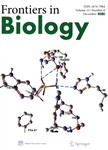Signal convergence through the lenses of MAP kinases: paradigms of stress and hormone signaling in plants
Signal convergence through the lenses of MAP kinases: paradigms of stress and hormone signaling in plants作者机构:Department of Plant Soil and Insect Sciences University of Massachusetts Amherst MA 01003 USA National Institute of Plant Genome Research Aruna Asaf Ali Road New Delhi 110067 India
出 版 物:《Frontiers in Biology》 (生物学前沿(英文版))
年 卷 期:2013年第8卷第1期
页 面:109-118页
核心收录:
学科分类:09[农学] 0903[农学-农业资源与环境] 0902[农学-园艺学] 090201[农学-果树学]
主 题:environmental stresses abiotic stress biotic stress mitogen-activated protein kinase kinase MAPKK mitogen-activated protein kinase MAPK plant signaling
摘 要:Common mechanisms plants use to translate the external stimuli into cellular responses are the activation of mitogen-activated protein kinase (MAPK) cascade. These MAPK cascades are highly conserved in eukaryotes and consist of three subsequently acting protein kinases, MAP kinase kinase kinase (MAPKKK), MAP kinase kinase (MAPKK) and MAP kinase (MAPK) which are linked in various ways with upstream receptors and downstream targets. Plant MAPK cascades regulate numerous processes, including various environmental stresses, hormones, cell division and developmental processes. The number of MAPKKs in Arabidopsis and rice is almost half the number of MAPKs pointing important role of MAPKKs in integrating signals from several MAPKKKs and transducing signals to various MAPKs. The cross talks between different signal transduction pathways are concentrated at the level of MAPKK in the MAPK cascade. Here we discussed the insights into MAPKK mediated response to environmental stresses and in plant growth and development.



